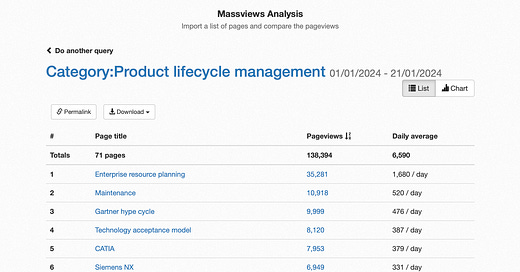#1 💡
Massviews Analysis is a super useful free tool to identify niche trends, whether you’re trying to research content ideas or doing research on business opportunities.
You can put in any Wikipedia category, and it will show you what pages inside that category are most popular.
For example, let’s say you identified “Human–computer interaction” as an interesting category, the tool will immediately show you stuff like “Cognitive ergonomics” as an interesting topic to learn more about, alongside with key players in the space and direct links to where you can learn more.
#2 💡
InVision design collaboration services is shutting down despite raising $300M+.
Definitely a cautionary tale of what happens when you stop listening to customers.
Last week I talked to Tom Critchlow and the key pattern he identified is that the successful companies he consults for are customer focused while the one that are struggling are not.
Organisations that are sales oriented or data-driven tend to lose touch with how customers truly get value out of their product.
How to tell if an organization is customer focused? Just ask how often people in the C-suite still talk to normal customers.
It's incredibly easy to overlook this simple responsibility in favor of tasks that seem to have a higher leverage when it’s really one of the highest value things you can do.
#3 💡
This seems like extremely useful data when looking for a business idea.
#4 💡
In this Freakonomics interview on why there's so much academic fraud, an interesting point is how the culture of different fields can affect fraud.
In short, in fields with norms of niceness people are too polite to tell you your research is flawed.
This is a problem that in my experience affects many entrepreneurial subculture.
On the one hand, it’s of course cool when people are positive and support each other. “Yeah congrats on your Product Hunt launch”, “That’s an awesome idea!”.
On the other hand, this also means that people will stick to dumb ideas for far too long.
Hardly anyone is willing to tell people that their idea is fundamentally flawed.
Definitely one big advantage startup founders have over indie founders as they will get feedback when pitching VCs.
Not sure what can be done about it but I 100% would have benefited from more honest feedback at many points in my entrepreneurial journey.
#5 💡
Education is something I’ve always cared a lot about. I hated going to school. Studying physics at university was incredibly inefficient.
It shouldn’t be that hard to find a better solution for something that will immediately impact the lives of millions of people, right?
Matt Bateman shared interesting insights why it’s actually incredibly hard.
End Note
As always, if you’re enjoying this brainstorm, I’d love it if you shared it with a friend or two. You can send them here to sign up.
Have a great week,
Jakob







Call it dystopian, but for years I've said that teachers and educators will someday be replaced by AI. Teachers instruct to the level of the average student in a room of 30, 50, or sometimes 100. This causes the progression to be fast and confusing to some students, and very slow and obvious to others.
An AI teacher would have a very good understanding of where each student is, and could work closely with them to challenge them at the levels they need. When a student has a question, they can ask without fear. When they're doing exceptionally well, they can progress to harder subjects.
Of course in the true dystopian society this AI is run by the government.